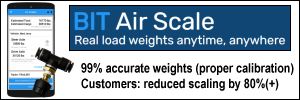If you drive a truck for a living (particularly long haul) and would like to sleep better when you retire for your mandatory rest break each day or night, you may benefit from the info we have assembled on this page.
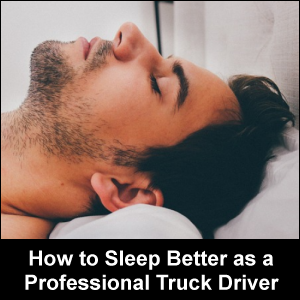 As we will describe, we have personally used or benefited from numerous points below.
As we will describe, we have personally used or benefited from numerous points below.
The main advantages of getting good restorative sleep are not only for the sake of your health, but also for the sake of your job.
Part of the reason why the Hours of Service regulations are in place is so that professional truck drivers will have enough time to sleep so as not to become drowsy or fatigued behind the wheel and cause accidents.
Fatigued Driving
There are those who persist in saying that the number of truck accidents due to fatigue is higher than it is.
The Owner-Operators Independent Drivers Association (OOIDA) put this to rest in October 2010, saying that, “… fatigued driving was coded as a factor in only 1.4 percent of fatal large truck crashes ….”(1)
However, we think you would agree with us that even one accident due to a professional truck driver not having been able to sleep better is one too many.
Challenges to Being Able to Sleep Better
There are many challenges to being able to sleep better in a truck, none of which is helped by the fact that you may be in a different location every night with different surroundings.
You may be kept awake — or awakened from sleep — by any number of things.
These are some of the common sleep inhibitors and interrupters for truckers:
- light;
- sounds;
- smells/odors;
- movement/vibration;
- uncomfortable atmosphere;
- health issues; and
- food and drink issues.
Factors that cause one person not to sleep better may not affect another and vice versa.
So, we’re going to address each of these items individually and in detail.
Now we must issue the disclaimer that part of the challenge that many professional drivers face is finding truck parking to begin with.
This can be very frustrating in the northeastern USA because there are too few spaces for the trucks running up there.
But assuming that you do find a place each night, here are tips on how to sleep better.*
To Sleep Better, Extinguish Exposure to Light
- Block as much light out of your truck as possible. Pull all of your curtains closed (cab and sleeper) for maximum darkness. You can put a sun shade next to your windshield to block even more light. Window tinting is illegal in some states, so we don’t recommend that at all.
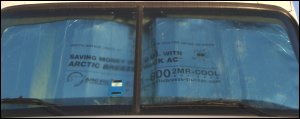
- Limit your exposure to light coming from television and computer screens right before bedtime. You may wish to occupy yourself with reading a book to unwind.
- Eliminate all sources of artificial light, especially from electronic gadgets like clock radios, CPAP machines, indicator lights, etc. We have already reported the problems associated being able to sleep better as long as a blue light is on in a truck.
- If necessary, wear a sleep mask to cover your eyes at night. Not knowing the difference between masks, Vicki purchased one in a beauty supply store years ago and tried it a few times, but it kept coming off her head in the night. (For your convenience, we are linking to or listing products on Amazon.com, with which we have an affiliate relationship.) If a higher quality sleep mask will help you sleep better, you might want to explore that option.
- If you find you have to rise in the middle of the night, try to keep the area in which you’re moving as dark as possible.
To Sleep Better, Remove or Reduce Sounds
- To help reduce as much sound or noise as possible from coming into your truck from outside — sounds such as trucks rolling past or the pulling of air brakes when a driver has parked nearby — aim to park (if possible) as far away from other trucks as you can, but still in a safe and secure location. Even oversized loads that straddle two places often have other trucks parked nearby.

- Avoid places where your truck door is likely to get knocked on in the night. Even public rest areas or service plazas are not immune to folks who like to keep truckers “company” at night. (We’ll share a couple of stories about that below.)
- If possible, avoid going to customers who wake you up — or require you to get up — in the middle of your rest break. Some facilities have a practice of bringing their unloading crews in at 3 or 4 in the morning!
- Turn the sound on your QualComm (satellite communications device) all the way down (or off). (We’ll share a story about that below.)
- If necessary, find and wear a good pair of ear plugs when you sleep.On the road, Vicki learned to wear a pair of ear plugs every night. She was amazed when she visited a firing range once just how much sound some ear plugs can block. They vary a bit, but Vicki has used both
- HEAROS Xtreme Protection Series Ear Plugs, Blue, 56 Pair (NRR 32) and
- Flents Ear Plugs, 50 Pair, Ear Plugs for Sleeping, Snoring, Loud Noise, Traveling, Concerts, Construction, & Studying, NRR 33.
Both versions are available in some drug stores or the pharmacy area of some department stores.
Look in the “ear care” area.
For what it’s worth, Vicki has found that the Flents ear plugs endure being washed with soap and water much better than Hearos.
(By washing built-up ear wax off the ear plugs, they can be used over and over again.) Just scrub with a toothbrush, rinse, squeeze out the excess water with a towel and let air dry.
- Consider using a white noise machine to help block out other sounds.We acquired a
Marpac SleepMate 980A Electro-Mechanical Sound Conditioner
after Mike transitioned out of regional driving, so we can’t speak to how well it would work in a truck. However, we find it valuable as an aid to sleep better. - Eliminate whenever possible sounds from snoring. There are various devices on the market to assist with this, ranging from a chin strap to nasal strips
- We have at times slept in a truck with only its side air vents open. For a long time, Vicki didn’t realize that some trucks allow the vents to open both ways (one way at a time). Primarily because sounds from outside can be heard, Vicki doesn’t like having a vent open right over her head.
- If you can do so without being uncomfortable, neither idle nor run an APU. There’s not much you can do about the sound of a reefer cycling. (Then again, some reefer drivers consider the cycling of their refrigeration units to be “music to their ears.”)
- Some drivers like to sleep with window screens in place. One disadvantage of using them is that they do not block sounds coming from outside your truck.
- One advantage of using truck window screens is their ability to keep flying insects from entering your truck. It’s aggravating to be right on the verge of falling asleep only to hear the high-pitched whine of a mosquito coming in for a landing on your ear! One does not want to spend valuable time getting rid of flies when they can be kept out in the first place.

To Sleep Better, Eliminate Smells/Odors
- Another disadvantage of using window screens is that they don’t block bad odors (like diesel exhaust) from entering your truck. You can block some bad smells by keeping your windows rolled up, but beware of lack of ventilation.
- Once, we were contacted by someone who liked to sleep with his truck windows down, but inevitably ended up having someone park next to him who idled his truck all night. He complained that he was not able to sleep better because he had to put up with the smell of diesel exhaust. Until all drivers have the ability to stay comfortable in their trucks without it, there will probably be someone parked nearby who is using a device for comfort (like an APU or climate control device).
- If you haul animals such as cattle or pigs, there’s not much we know of (apart from having your trailer washed out) to cut down on odors.
- Stay as far away from sources of odors as you can (like not parking next to dumpsters with discarded foodstuffs or a row of poorly treated outdoor toilets in the heat of the summer).
- Along this same theme, if you can avoid it, do not park near industrial facilities that are known to produce bad odors like paper mills and sewage treatment facilities. Don’t even park downwind from these facilities as the odors coming from them can waft.
- Don’t forget to prevent bad odors from developing inside your truck. Remember to dump your garbage or trash regularly (such as in the trash barrels on fuel islands at truck stops) and to keep your portable toilet clean (such as with baking soda).We have found it convenient to hang an old intact plastic grocery bag from the aisle-side armrest of the passenger seat to use as a garbage bag. When it got filled up, we would tie it closed and throw it away. For us, the smelliest garbage we dealt with was the packaging from raw chicken. (We usually cooked the meat as crock pot chicken.)
- In the event that there is a sleep-disturbing odor in your truck (such as cigarette smoke, emissions of intestinal gas, pet smells, etc.), you may wish to consider obtaining an appropriate deodorizer or odor neutralizer — whether manually or automatically triggered. As masking scents don’t eliminate odors, standard air fresheners may or may not work.
To Sleep Better, Reduce, Remove or Adjust Movement/Vibration
- Aim to park for better sleep in places where your truck and trailer won’t sway from side to side. Never park on the shoulder of a major highway or interstate to sleep. As if the whoosh of traffic going by isn’t bad enough, you could be facing questions from a law enforcement officer. Depending on where you’re running, it could be illegal to park on an on-ramp or off-ramp.

Also, if you’re in a high wind area, see if you can park behind a wind break or so that the wind is not coming from the side. - If you idle your truck for comfort but find that the frequency of the vibration prevents you from being able to sleep better, see if you can adjust the engine’s RPMs to something that is more pleasant.When Vicki joined Mike full-time in his truck in 2009, the frequency of the truck’s engine at unadjusted idle speed — which had not bothered him — did bother her. He ended up reducing the engine’s RPMs to a frequency that worked well for both of us to sleep better. This situation had the additional benefit of the engine using less fuel. Eventually, his company put a battery-powered climate control unit in the truck, which mostly eliminated the need to idle, and therefore the vibrations due to idling.
- It may not be possible depending on your schedule, but aim to park for your sleep break at times when you don’t have to have your trailer loaded or unloaded. Unless you’re in a dock where the shipper or receiver requires you to pull the tractor out from under the trailer, every time a forklift or Hyster has to enter or exit your trailer, there is movement.
- If you are super sensitive to movement when you sleep, either don’t carry a pet with you (who may move around and disturb you) or else put it in an approved pet carrier before you retire.
- Also, you may wish to use the type of cold food storage device that doesn’t vibrate or rattle (like an ice chest).
To Sleep Better, Seek to Make an Uncomfortable Atmosphere More Comfortable
- Seek to optimize the temperature in your truck. It has been said that the optimum temperature to sleep better is between 60°F (15.6°C) and 68°F (20°C). Climate control options include engine idling, APUs, battery-connected units and shore power.
- Seek to moderate the humidity level in your truck. We’ve never heard of a professional driver putting either a humidifier or dehumidifier in his/her truck, but we suppose it is possible.
- Adjust the feel of your sleeper mattress if necessary with a topper or pad. As we learned, even a brand new mattress can be uncomfortable!We decided to invest in a SleepBetter 5 Zone King Mattress Pad and cut it up the middle so that we each got half — one for the top bunk and one for the bottom. It made a huge difference in the level of comfort between the mattresses and our sleeping bags — enabling both of us to sleep better. With the pad in place, Vicki said that she didn’t have to worry about mattress springs poking her anymore!
- Give yourself enough room to move around during your sleep. A zipped up sleeping bag that is too narrow may restrict your movements and hinder your ability to sleep better.When Vicki slept in her sleeping bag in the truck, she left the zipper open most of the way down the side. That way, she could easily turn and even exit to use the portable toilet in the night without making a zipper noise (that could have awakened Mike). Mike’s second sleeping bag was narrower than his first. Still, he chose to sleep in his bag with the zipper all the way up. It’s a matter of preference.
To Sleep Better, Address Health Issues
- Try as much as possible to sleep when it is dark outside, so as to try to be in sync with your body’s circadian rhythm.
- If you find yourself being tired all the time, you could have undiagnosed sleep apnea. The best thing to do in cases like this is to schedule a sleep study. If you are diagnosed with sleep apnea, it may become necessary to start using a CPAP machine when you sleep. (We plan to cover this issue in greater detail later.) Many professional drivers with sleep apnea who use CPAP machines report that they sleep better with them than without them.

- Seek to alleviate sickness, the symptoms of which could interrupt your sleep. Head or chest congestion could hinder your ability to breathe or could cause you to cough. Beware of any medication that could cause drowsiness during waking hours.

- We do not at all recommend getting on the roller coaster of using pharmaceutical aids (like sleeping pills) to assist with sleep. Seek to use natural sleep aids.
- Don’t engage in vigorous physical exercise just before going to bed. Give yourself time to unwind.
To Sleep Better, Address Food and Drink Issues
- If you have a small bladder, reduce the amount of fluids you consume at least two hours before going to bed to avoid middle-of-the-night bathroom breaks. Unless you’re an owner-operator with a built-in bathroom in your truck, having a portable toilet in your truck removes the need for you to have to leave your truck to use the restroom.
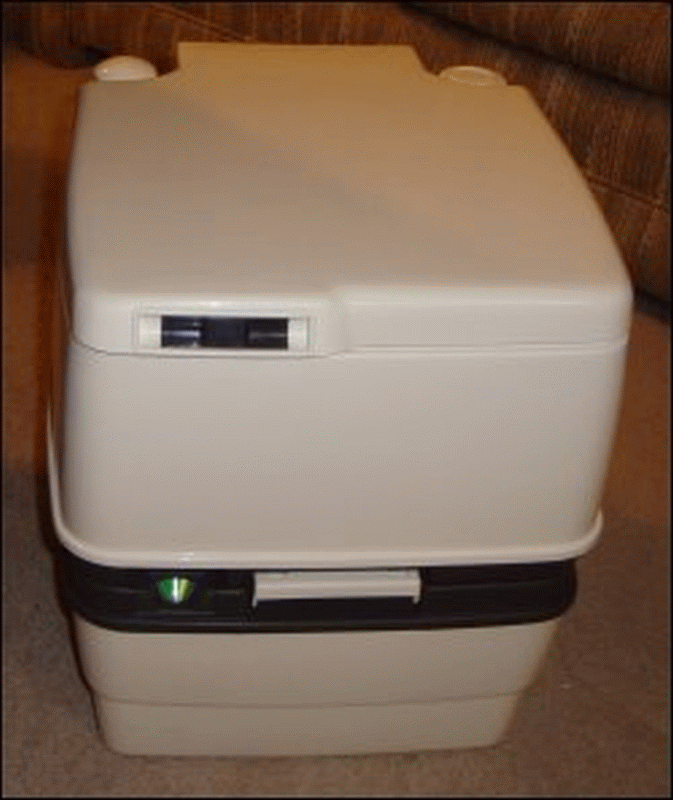
- If you find yourself having trouble falling asleep or staying asleep, evaluate your caffeine intake (such as from coffee, tea or chocolate). Reduce your intake below what causes sleeplessness.
- If possible, eat the kinds and quantity of food that will help you sleep better. Never eat an energy bar or drink an energy drink within a short time of going to sleep.
An External Challenge We Have Faced to Sleeping Better
Perhaps you have had this experience.
You’re sound asleep in your truck in what you think is a safe, legal parking space — even in a truck stop or rest area — and around 2 or 3 in the morning, there’s a knock at your driver’s side door.
If you don’t answer it or make other arrangements, there may be another in about 30 minutes, and another 30 minutes after that, etc., etc., ad infinitum, ad nauseum.
We’ve had this happen to us a number of times in states ranging from South Carolina to Connecticut.
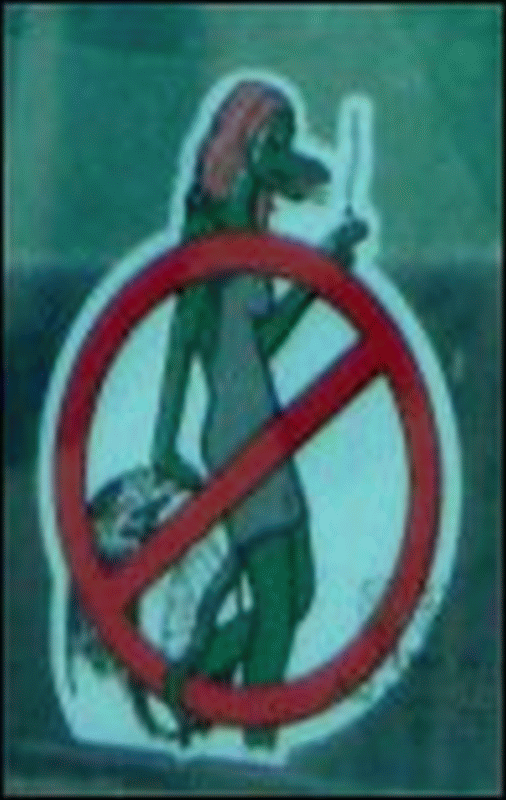 One night when Mike tried without success to find a parking space at one of the two truck stops in Milford, Connecticut (I-95, exit 40), he decided to go north by a mile or so and try to get a parking space at the rest area.
One night when Mike tried without success to find a parking space at one of the two truck stops in Milford, Connecticut (I-95, exit 40), he decided to go north by a mile or so and try to get a parking space at the rest area.
He found a spot, but it was the worst night’s sleep on the road Vicki had ever had.
She counted five separate knocks on the door in the course of the night!
(Mike usually tries to ignore knocks on the door in the night, but Vicki can’t. Once her heart gets to pounding and the adrenalin is flowing, it’s hard for her to fall back to sleep.)
We have heard of various ways to ward off “lot lizards” and would be interested to know which of them really work the best for the least amount of money.
Opinions may vary, but Mike says that “no lot lizard” signs like the one shown at left don’t work.
There is a story about a trucker who once had a knock on his door in the wee hours of the morning at a truck stop.
He got up, pulled his cab curtain back, and saw a woman on the ground just outside his door.
He had already turned on his cell phone and was ready to use it.
He rolled down the window just far enough so she could hear.
Showing his cell phone to her, he told the woman in no uncertain terms that she had 5 seconds to move away from his truck before he called the police, and not only that but to tell her “friends” to stay away from his truck, too.
He wasn’t disturbed for the rest of the night.
Another perspective on this situation is that a female knocking on a trucker’s door may need to be rescued from sex trafficking. To help with that, please visit TruckersAgainstTrafficking.org.
An Internal Challenge We Once Faced to Sleep Better
There was a time when the model of QualComm Mobile Communications Terminal (aka “satcom”) installed on trucks didn’t have an “off” feature or ability to turn the volume all the way down.
This is a photo of one model, but not the one we’re referring to here…
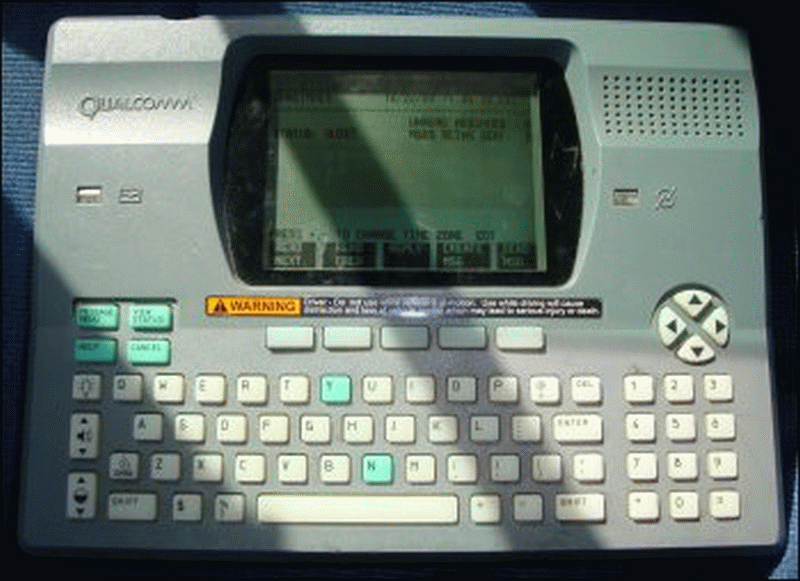
The first time Mike drove for Epes Transport, he was assigned to a new fleet manager named “Joey.” (Vicki was riding with Mike when this happened.)
Joey liked to send out non-essential messages over the QualComm.
In those days, whenever anyone sent a message over QualComm, the unit would emit a loud “BEEP!”
How is a person supposed to sleep better with that thing going off every time a message came through?
What could we do to temper, soften or reduce the volume of the beep?
Taping a cotton ball across the speaker area did not work!
Of course as is the case with many professional drivers, Mike’s sleeping schedule varied.
So there were times when he would be trying to sleep during the day after driving the night before.
And of course, Joey had a “day job.” (You may see where this is heading…)
It seemed that Joey sent out a lot of messages.
Mike tried reasoning with him about the number of messages he was sending, but to no avail.
One day after Mike had run particularly hard — and neither of us had been able to sleep better because of all of Joey’s messages — Mike parked his company-issued truck in a rest area in northern Kentucky.
We were exhausted.
Mike sent a message to Joey that he had been driving most of the night, he was very tired, he was going to bed, and he didn’t want to be disturbed.
In spite of Mike’s message, we pretty much knew what was coming.
So we wrapped the QualComm unit in a thick towel, then in a plastic Wal-Mart bag (to keep it from getting wet) and literally stuck it out the door!
Finally!
We were able to sleep better. Whew!
We don’t recall how long we slept, but when we rescued the unit from its out-of-doors location, what to our wondering eyes should appear but a bunch of messages waiting for us from Joey!
Ha ha!
Mike left the company to take a job elsewhere for awhile and didn’t have to put up with Joey or his “love notes” anymore.
When Mike went back to work for Epes, he specifically inquired about Joey and found out that he had left the company.
Nowadays, trucks with new QualComm MCTs in them can be adjusted so that the volume goes all the way down.
Hurray!
Now drivers can sleep better without all that “beeping” going on.
![]() Money saving tip: Seek the low-cost methods of helping you to sleep better.
Money saving tip: Seek the low-cost methods of helping you to sleep better.
The costs to purchase ear plugs, an eye mask and a truck sun shade are all modest.
Even a more expensive item like a mattress pad can make all the difference and turn out to “pay for itself” in improved sleep.
Sometimes a fifteen-minute “power nap” can rejuvenate a person who didn’t sleep better the night before, but watch out for problems associated with Hours of Service regulations.
Keep your cell phone fully charged in case you need it.
Unless you use yours for an alarm clock for waking, turn it off when you go to sleep.
It has been argued that the electronic frequency used by cell phones can inhibit sleep, so use your own best judgment in this regard.
Some cell phones have settings that allow users who use the alarm clock setting to hear only the alarm (not ringing when a call comes in).
Many of the deodorizers or air fresheners that come on a string that can be hung from a rearview mirror quickly lose their scent.
So evaluate for yourself if this is a good value.
Finally, maintain good relationships with your family members.
Nothing gets some people so riled up as disagreements with relatives.
Stewing on a situation mentally is sure to weigh heavy on your mind, preventing mental relaxation.
We’ve also found it beneficial to keep a clear conscience regarding all matters of life.
When you lie down to rest, you will sleep better, being at peace.
Return from How to Sleep Better as a Professional Truck Driver to our Health and Wellness page or our Truck Drivers Money Saving Tips home page.
Reference:
1. www.landlinemag.com/Story.aspx?StoryID=19786 (no longer online)
* Some ideas on this page were adapted for truckers from Dr. Mercola’s tips:
articles.mercola.com/sites/articles/archive/2010/10/02/secrets-to-a-good-night-sleep.aspx (no longer online)

